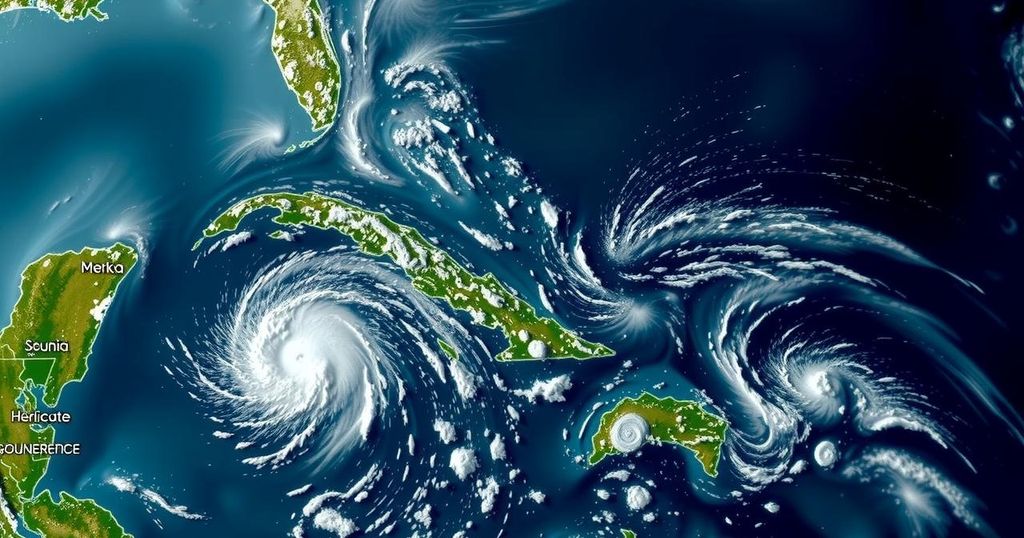Global news
AFRICA, ASHEVILLE, ATLANTIC, BE, BERMUDA, BRIAN MCNOLDY, CARRIACOU, CUBA, DOMINICAN REPUBLIC, EUROPE/ASIA, EVACUATIONS, FLORIDA, FORT LAUDERDALE, GEORGIA, GRENADA, GULF COAST, GULF OF MEXICO, HELENE, HURRICANE, HURRICANE BERYL, HURRICANE SEASON, JAMAICA, KATE, KATRINA, MIAMI, NATIONAL HURRICANE CENTER, NATURAL DISASTER, NORTH AMERICA, NORTH CAROLINA, OF MIAMI, ORLANDO, RAFAEL, SOUTH AFRICA, SOUTH CAROLINA, TAMPA, TENNESSEE, U. S, U. S. GULF COAST, UNITED STATES, UNIVERSITY, UNIVERSITY OF MIAMI, VIRGINIA, WEATHER
Jamal Walker
0 Comments
2024 Atlantic Hurricane Season Ends with Record Storm Activity and Damage
The 2024 Atlantic hurricane season concluded with 11 hurricanes, significantly above the average of seven, resulting in widespread destruction. Hurricane Beryl became the first June Category 4 hurricane, while Hurricane Helene caused over 200 fatalities. The season’s anomalies were linked to warm ocean temperatures influenced by climate change, heightening the potential for extreme weather events.
The conclusion of the 2024 Atlantic hurricane season on Saturday marked an unprecedented year characterized by 11 hurricanes, significantly surpassing the average of seven. This season was dubbed ‘crazy busy’ by meteorologists due to exceptionally warm ocean temperatures affecting storm patterns. Eight hurricanes made landfall across numerous areas, including the U.S., Bermuda, Cuba, the Dominican Republic, and Grenada.
One notable event was Hurricane Beryl, which emerged as the first recorded Category 4 hurricane in June, impacting Carriacou in Grenada and wreaking havoc in Jamaica, resulting in two casualties. Beryl subsequently became the earliest Category 5 hurricane in the Atlantic on July 1, a significant anomaly given that major hurricanes typically do not develop until after September 1 according to the National Hurricane Center.
In September, Hurricane Helene struck the southeastern United States, leading to devastation that resulted in over 200 fatalities, marking it the deadliest storm since Hurricane Katrina in 2005. North Carolina reported staggering damages valued at approximately $48.8 billion, affecting various infrastructures, from homes to agriculture. Other states such as Florida, Georgia, South Carolina, Tennessee, and Virginia also faced severe repercussions.
October witnessed Hurricane Milton, which rapidly intensified to reach maximum wind speeds of 180 mph, classifying it among the most powerful hurricanes recorded in the Gulf of Mexico, second only to Hurricane Rita in 2005. Regions affected by Helene and Milton experienced rainfall three times their average for September and October, disrupting normal weather patterns significantly.
Later in November, Hurricane Rafael approached near the strongest November hurricane on record with wind speeds of 120 mph, affecting Cuba during its recovery from Hurricane Oscar. Climate experts have underscored the role of climate change in rendering the oceans warmer, encouraging the occurrence and severity of hurricanes earlier and later in the season than customary. According to Brian McNoldy, a hurricane researcher at the University of Miami, this warming allows storms to form and intensify unpredictably.
While it is difficult to directly attribute climate change to individual weather events, its influence on storm patterns creates a heightened likelihood for more extreme storms. McNoldy stated, “I do not ever point to climate change as causing a specific weather event, but it certainly has its finger on the scale and makes these extreme storms more likely to occur.”
The Atlantic hurricane season annually spans from June 1 to November 30, during which meteorological conditions typically favor the development of hurricanes due to warm ocean waters and atmospheric conditions. The 2024 season proved particularly severe, with a record number of hurricanes and catastrophic impacts across the region, attributed in part to rising ocean temperatures influenced by climate change, leading to unusual hurricanes forming outside of traditional timelines and strength categories.
In conclusion, the 2024 Atlantic hurricane season has underscored the alarming trend of increasing hurricane activity and severity, exacerbated by climate change. The impacts of hurricanes Beryl, Helene, Milton, and Rafael illustrate the devastating consequences for communities across the Caribbean and southeastern United States. As climate change continues to influence weather patterns, the necessity for preparedness and resilience measures becomes ever more critical for affected regions.
Original Source: wsvn.com




Post Comment